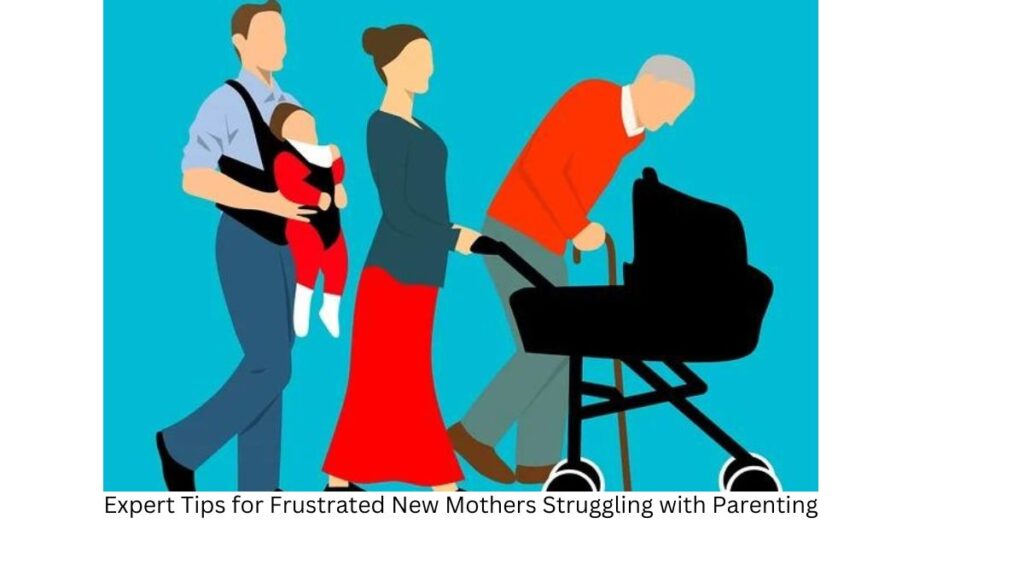Introduction:-
Expert Tips for Frustrated New Mothers Struggling with Parenting

Becoming a new mother is a transformative and beautiful experience, but it also comes with its fair share of challenges. Many new moms find themselves feeling frustrated or overwhelmed by the demands of parenthood. If you’re one of them, take comfort in knowing that you’re not alone, and there are expert tips to help you navigate this rewarding yet occasionally trying journey.
What is your advice to frustrated new mothers who love their children but find parenting difficult?
1. Seek Support from Trusted Sources

New mothers often feel they should be able to handle everything on their own. However, seeking support from friends, family, or a support group can be a game-changer. Connecting with people who’ve been through the same struggles can offer a fresh perspective and much-needed emotional support.
2. Prioritize Self-Care
Remember, you can’t pour from an empty cup. Prioritize self-care by getting enough rest, eating well, and finding time for activities that rejuvenate your spirit. When you take care of yourself, you’re better equipped to care for your little one.
3. Accept Imperfection
No one is a perfect parent, and that’s okay. It’s important to embrace the imperfections and mistakes that come with parenthood. Learn from them and use them as opportunities to grow and become a better mother.
4. Create a Routine
Establishing a daily routine can provide structure and predictability for both you and your child. Consistency helps babies and toddlers feel secure, which can reduce frustration for both of you.
5. Communicate with Your Partner
If you have a partner, open communication is key. Discuss your parenting challenges, goals, and divide responsibilities to create a supportive partnership that eases the burden on both of you.
6. Educate Yourself
Knowledge is power. Take advantage of parenting classes, books, and online resources to gain insights and strategies for managing common parenting issues. Being well-informed can boost your confidence.
7. Practice Patience
Parenting can test your patience, but practicing patience is vital. Remind yourself that your child is learning and growing, and it’s natural for them to make mistakes or be challenging at times.
8. Manage Expectations
Avoid comparing yourself to others and having unrealistic expectations. Every child is unique, and what works for one parent may not work for another. Focus on what’s best for your family.
9. Know When to Ask for Professional Help
If feelings of frustration or overwhelm persist and affect your well-being, don’t hesitate to seek professional help. A therapist or counselor can provide guidance and support to navigate difficult emotions.
10. Embrace the Joy
Amidst the challenges, remember to savor the joy and beauty of motherhood. Those precious moments of laughter, cuddles, and milestones are what make it all worthwhile.
Is it normal to get frustrated as a new parent?
Yes, it is entirely normal to feel frustrated as a new parent. Parenting is a rewarding but challenging experience, and it can be overwhelming at times. New parents often face sleep deprivation, the demands of a new baby, and the adjustment to a completely changed lifestyle. All of these factors can lead to feelings of frustration, stress, and even self-doubt.

It’s important to remember that frustration doesn’t mean you’re a bad parent. It’s a natural reaction to the significant changes and challenges that come with caring for a new baby. Many new parents experience moments of frustration, and it’s crucial to recognize these feelings, acknowledge them, and seek support when needed.
Here are some tips to manage and cope with frustration as a new parent:
- Seek Support: Reach out to friends, family, or support groups for emotional support and practical help. Talking to others who have experienced similar challenges can be comforting.
- Take Breaks: It’s okay to take short breaks when you need them. Ask a trusted person to watch your baby for a little while so you can recharge.
- Practice Self-Care: Prioritize self-care by getting enough rest, eating well, and finding time for activities that rejuvenate you.
- Communicate: Share your feelings with your partner or a trusted friend. Open communication can help relieve emotional stress.
- Educate Yourself: Read parenting books or take classes to better understand your baby’s needs and developmental stages.
- Ask for Help: Don’t hesitate to ask for help from healthcare professionals, therapists, or counselors if you’re feeling overwhelmed or struggling with your mental health.
- Accept Imperfection: Remember that no one is a perfect parent. It’s okay to make mistakes and learn from them.
- Celebrate the Joys: While there are challenges, there are also many moments of joy and love in parenting. Savor these moments and focus on the positive aspects of parenthood.
It’s essential to be patient with yourself and know that as you gain experience and adapt to your new role as a parent, some of the initial frustrations may lessen over time. Don’t hesitate to reach out for help and support when needed, and remember that you’re not alone in feeling this way.
Can babies feel parent’s frustration?
Babies are highly attuned to their caregivers’ emotional states, and they can often sense and respond to their parents’ emotions, including frustration. While babies may not understand the specific source of their parents’ frustration, they can pick up on the emotional cues and changes in their parents’ tone of voice, facial expressions, and body language.
When parents are frustrated, it can potentially affect the baby’s emotional well-being and development. Here are some ways in which babies might react to their parents’ frustration:
- Emotional mirroring: Babies often mirror the emotions of their caregivers. If parents are consistently frustrated or stressed, it can create an environment where the baby may become more irritable or anxious.
- Increased crying: Babies may cry more when they sense their parents’ frustration, as they pick up on the tension and respond with their own distress.
- Difficulty soothing: A stressed or frustrated parent may have difficulty soothing a baby, which can lead to further frustration for both the parent and the baby.
- Attachment and bonding: A positive and nurturing environment is crucial for healthy attachment and bonding between parents and their infants. Ongoing frustration and tension within the family can impact this bonding process.
It’s important for parents to be aware of their emotional states and try to manage their frustration in a healthy way, especially when caring for a baby. Techniques like taking short breaks, seeking support from other caregivers or professionals, and practicing self-care can help parents better manage their emotions and provide a more stable and nurturing environment for their baby. Babies benefit from a calm and loving care giving environment, and parents’ emotional well-being is closely linked to their baby’s emotional development.
In conclusion:-
new mothers facing parenting difficulties need not feel alone or overwhelmed. With expert tips, support, and self-compassion, the journey of motherhood can become more manageable and enjoyable. Embrace the lessons, cherish the moments, and know that you are doing an amazing job.





